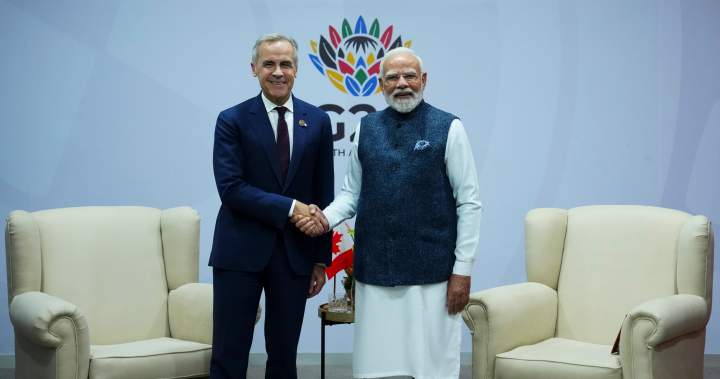Canada and India have agreed to work towards a comprehensive trade deal, reviving efforts that first began 15 years ago.
A readout from Indian Prime Minister Narendra Modi’s office said he and Canadian Prime Minister Mark Carney agreed to begin negotiations on a “high-ambition” comprehensive economic partnership agreement (CEPA).
Modi also invited Carney to visit India, though no time was specified.
“The ability to have more effective trade with them to scale that trade with them would be greatly helped by that (an agreement),” Carney told reporters earlier Sunday at the G20 summit.
According to the readout, the trade agreement would be aimed at doubling bilateral trade to US$50 billion by 2030.
A readout had not been issued by the Prime Minister’s Office as of 4 p.m. Sunday.
Foreign Affairs Minister Anita Anand confirmed the formal launch to the Canadian Press, saying the trade deal would include goods, services, investments, agriculture, digital trade, labour mobility, and sustainable developments.
“The leaders are both moving with alacrity to ensure that this CEPA is concluded as soon as possible,” Anand said.

Get breaking National news
For news impacting Canada and around the world, sign up for breaking news alerts delivered directly to you when they happen.
The two countries first started talks in 2010, but eventually downgraded those efforts to a deal that would only touch specific industries up until fall 2023.
Trade talks between India and Canada were suspended in late 2023 after the Ottawa went public with allegations from the RCMP that the Indian government was behind the assassination of Hardeep Singh Nijjar, a Sikh activist, near Vancouver in June 2023.
Earlier this month, Global News also confirmed that conversations intercepted by Canada and the United Kingdom implicate high-level Indian officials in Nijjar’s assassination.
India was also one of four countries named by the head of Canada’s intelligence service, Dan Rogers, as he catalogued the espionage and transnational repression efforts by Canada’s adversaries.
When asked by reporters on Sunday about the threat that remains from India, Carney said he was aware of the “threat landscape.”
“With respect to any forms of foreign interference, we have to remain vigilant — we are vigilant,” he said.
But the prime minister added he sees India as a reliable trading partner.
“Canada has quite an actual strong commercial relationship with India. We are one of the largest, for example, foreign investors in India,” he said.
“What we’re looking to do is to put that on a sound footing through a potential trade agreement between the two countries, which give protections to our businesses, protections to Indian businesses, (a) clear set of rules, dispute mechanisms and others and build on those opportunities.”
The comments are the opposite of what Carney said about the U.S. during the federal election campaign in March that the U.S. is no longer a “reliable” trading partner.
While Canada and India plan to work towards the trade deal, the two countries alongside Australia announced a trilateral technology and innovation partnership during the G20 as well. That partnership is aimed at strengthening cooperation on critical minerals, clean energy and artificial intelligence (AI).
Modi’s office said in its readout both countries reaffirmed their civil nuclear cooperation and ongoing discussions on increasing collaboration, such as through long-term uranium supply agreements.
—with files from Global News’ David Akin, Stewart Bell, Jeff Semple and Saba Aziz, and The Canadian Press
Read the full article here

